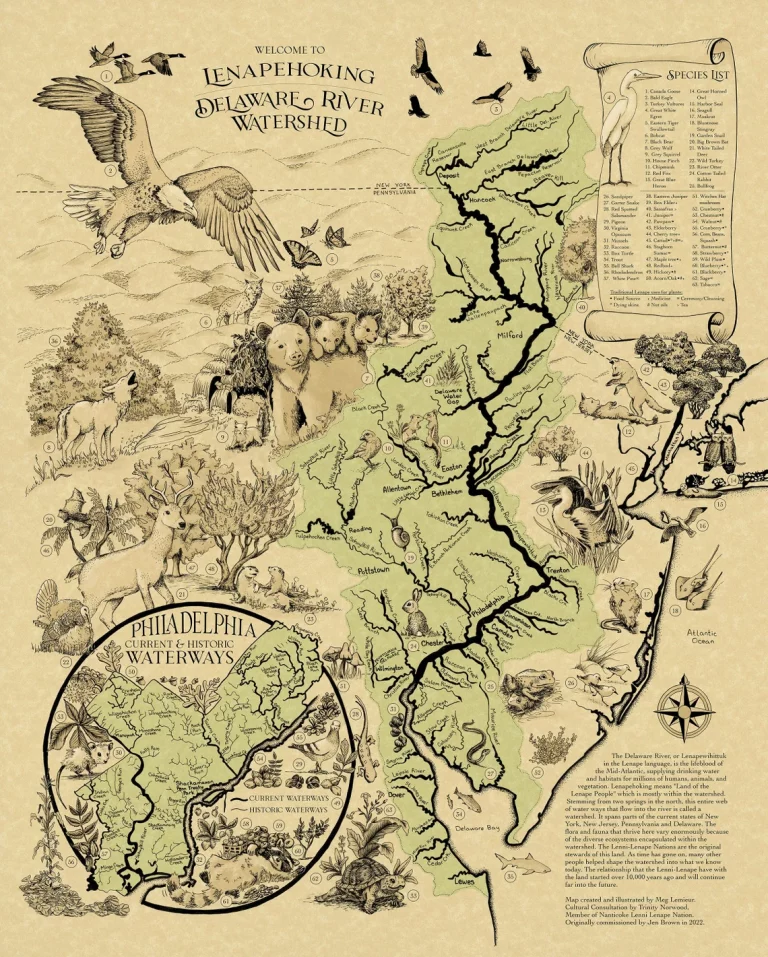Farm Philly Land and Life Acknowledgment
For centuries, the land currently known as Philadelphia has been home to and cared for by the Lenni-Lenape People of Lenapehoking and the Poutaxat (Delaware Bay).
For centuries, the land currently known as Philadelphia has been home to and cared for by the Lenni-Lenape people of Lenapehoking and the Poutaxat (Delaware Bay). We acknowledge that thousands of Lenni-Lenape people from the PA/NJ/NY region were forcibly displaced by European colonizers and the U.S Indian Removal Act of 1860. At Farm Philly, we recognize the Tribes’ strength and history of resistance to the ongoing violence of settler-colonization. We commit to honoring their history, presence and future, and supporting regional Tribal Nations, including but not limited to the Nanticoke Lenni-Lenape Tribal Nation; the Ramapough Lenape Nation; and the Powhatan Renape Nation, The Nanticoke of Millsboro Delaware, the Lenape of Cheswold Delaware, and more.
We know that our modern systems of growing food and owning property are built on the stolen land of Indigenous people, the enslavement and barbaric exploitation of African people, and the genocide of both Native and Black communities and cultures. These violent acts continue to impact Black and Indigenous communities today. We must understand and name these realities and how they influence who has power over land and food in Philadelphia.
Black and Indigenous communities have deep knowledge and innovation in agriculture, food sciences and land stewardship, but have been largely ignored or erased in the documentation of that collective knowledge. We commit to lifting up these practices in Philadelphia’s urban agriculture.
To learn more about and support Lenape Tribes* and Native/Indigenous communities, please visit the following:
- Indigenous Peoples’ Day Philly, Inc.: https://ipdphilly.org/
- Lenape Nation of Pennsylvania: https://www.lenape-nation.org/
- The Nanticoke Lenni-Lenape Tribal Nation: https://nlltribe.com/
- The Ramapough Lenape Nation: https://ramapomunsee.net/
- The Nanticoke of Millsboro Delaware: https://www.nanticokeindians.org/
- The Lenape of Cheswold Delaware: http://www.lenapeindiantribeofdelaware.com/

Here are some resources to support national Black land preservation and Liberation projects:
- The Federation of Southern Cooperatives Land Assistance Fund: https://www.federation.coop/about-us
- National Black Food and Justice Alliance: https://www.blackfoodjustice.org/
- Black Farmers Network: https://blackfarmersnetwork.com/
- Reparations Summer and the Drinking Gourd Network: https://reparationssummer.com/our-folks/
- Northeast Farmers of Color Land Trust: https://nefoclandtrust.org/
*Although there are several state and federally recognized Lenape tribes in the United States and First Nations in Canada, and there are hundreds of Tribal Nations not recognized by The US government. Therefore, there are many “unrecognized” Tribes of Lenape existing in many states, including Delaware, Maryland, New Jersey, Pennsylvania, Virginia, Idaho, and Kansas.
